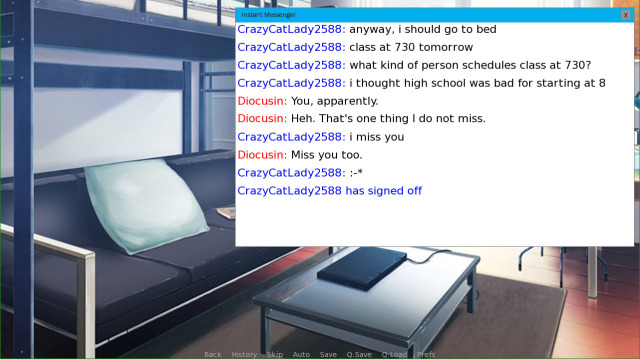One thing I knew I wanted in the game from the beginning was instant messenger conversations – I remember using it basically exclusively for short-form communication from middle school through college, and it seemed appropriate that college students in 2006 would be using it.

This would be straightforward to do normally in RenPy. You can make a ParameterizedText object and just show it with your desired text whenever you need a new line.
image imwindow = Image("sp/imwindow.png", xanchor=210, ypos=0.69)
image im1 = renpy.ParameterizedText(xanchor=190, ypos=0.1)
image im2 = renpy.ParameterizedText(xanchor=190, ypos=0.15)
…etc
And then
show imwindow
show im1 "{color=#f00}Diocusin:{/color} {color=#000}This is a test.{/color}"
$ renpy.pause()
hide imwindow
hide im1
However, that gets very verbose very fast. I wanted to be able to easily script IM conversations using character names instead of raw text, and I wanted to automatically handle coloring and showing and hiding, as appropriate.
RenPy allows you to define your own commands, so I defined one to hide and show the background window. (The one to show it is technically not necessary, but it’s here for completeness.)
python early:
def parse_hideim(lex):
return "”
def execute_hideim(o):
renpy.hide("imwindow")
renpy.hide("im1")
renpy.hide("im2")
…etc…
_window_show(trans=None)
renpy.register_statement("hideim", parse=parse_hideim, execute=execute_hideim)
def parse_showim(lex):
return "”
def execute_showim(o):
_window_hide(trans=None)
renpy.show("imwindow")
renpy.register_statement("showim", parse=parse_showim, execute=execute_showim)
Then it’s fairly straightforward to define a command that shows a message.
def parse_im(lex):
num = lex.simple_expression()
who = lex.simple_expression()
pause = lex.simple_expression()
msg = lex.rest()
return (num, who, pause, msg)
def lint_im(o):
num, who, pause, msg = o
if(who != "mc" and who != "janet" and …etc…):
renpy.error("Invalid IM speaker " + who)
if(pause != "p" and pause != "n"):
renpy.error("Invalid pause value " + pause)
if(int(num) < 1):
renpy.error("Invalid IM number " + num)
def execute_im(o):
num, who, pause, msg = o
formatmsg = ""
if(who == "mc"):
formatmsg += "\"{color=#f00}Diocusin:{/color} {color=#000}"
elif(who == "janet"):
formatmsg += "\"{color=#00f}CrazyCatLady2588:{/color} {color=#000}"
…etc…
else:
renpy.error("Invalid IM person " + who)
formatmsg += "\"" + msg + "\""
formatmsg += "{/color}\""
if(not renpy.showing("imwindow")):
execute_showim("foo")
imnum = "im"+num
renpy.show((imnum, formatmsg))
if(pause == "p"):
renpy.pause()
renpy.register_statement("im", parse=parse_im, execute=execute_im, lint=lint_im)
This command can then be used to carry on a conversation within a script.
im 1 mc p "This is a test."
im 2 janet n "this is only a test, and clicking just once"
im 3 janet p "shows both of these lines together"
hideim
Note that, if I were doing this now, I would keep a counter variable that automatically increments the im number, and reset it in the hideim command. It would simplify IM conversations to something like
im mc p "This is a test."
im janet p "this is only a test"
hideim
but there’s something to be said about knowing exactly how many lines into a conversation you are at any given moment.
There are probably better ways to do this, and someone more comfortable with Python and the RenPy engine could undoubtedly make this cleaner. But this got the job done for me.
Also never underestimate the power of lint. It’s a most excellent way to catch stupid mistakes when using your custom commands.
Leave a comment